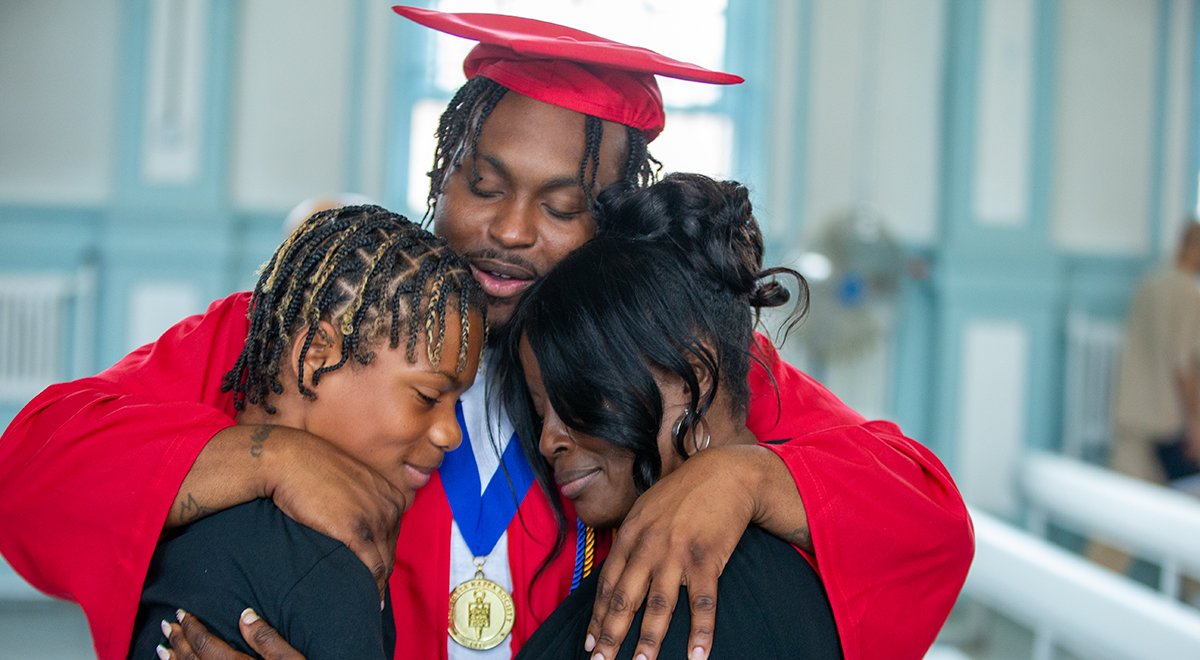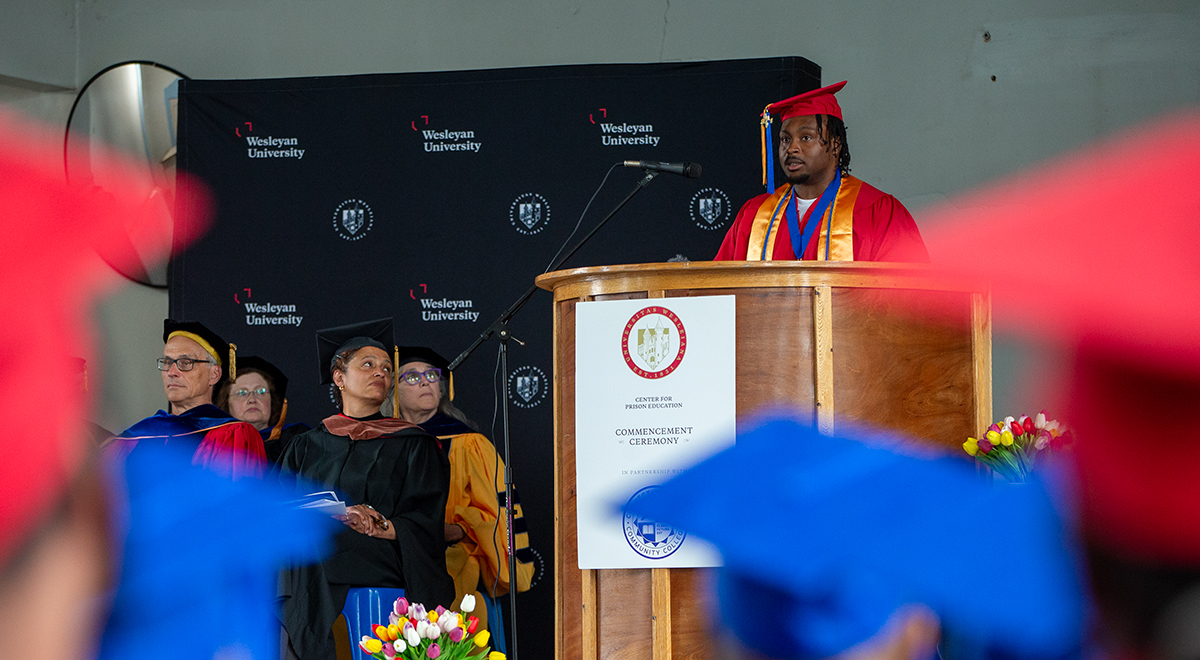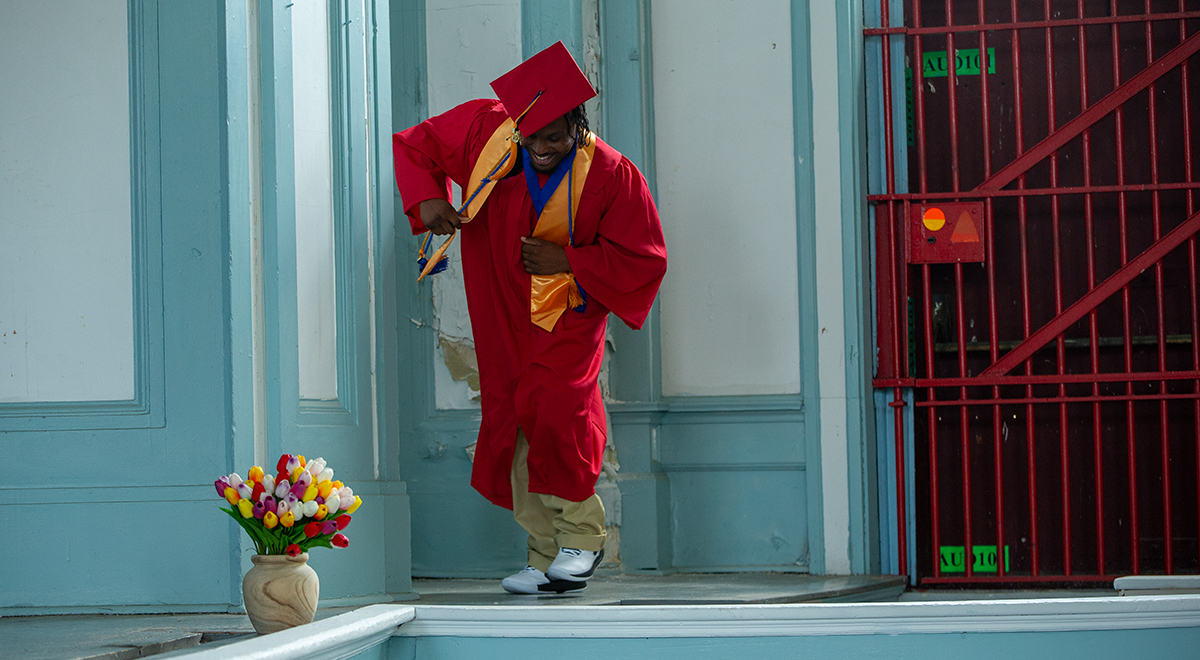At Center for Prison Education Commencement, Enduring Change Through Higher Education

The midday sun beamed through barred windows into a high-ceilinged auditorium at Cheshire Correctional Institution as Andrew “Duke” Dickson ’24 donned a red gown and took to a centerstage pulpit. He was moments from receiving the college degrees he’d earned through Wesleyan’s Center for Prison Education in front of an audience that included his mother, son, professors, other incarcerated individuals, and, seated stage right, President Biden’s education secretary.
But first, Dickson reflected on the trials, transformation, and good fortune that led to him and the 18 other incarcerated individuals receiving degrees to this day. “It is not that we are smarter or better than the brothers in this building not in attendance,” Dickson told the audience, a medallion signaling his 4.0 GPA hung from his neck. “This moment is the result of choice and chance. Although for us it started with ambition, this journey began with being afforded an opportunity: the opportunity to receive a college education while incarcerated is one of the greatest ones I personally have received.”
Held on June 5, the Wesleyan Center for Prison Education’s (CPE) Fourth Commencement was the first in which students graduated with bachelor’s in liberal studies (BLS) degrees from Wesleyan. More than that, it was an occasion to celebrate the fruits of the CPE, a partnership between Wesleyan, Connecticut State Community College Middlesex, and the Connecticut Department of Correction that’s grown into the longest-running college-in-prison program in the state. And ultimately, it was a moment to honor the dedication, sacrifice, and persistence of the students themselves.
“The work all of you have done . . . has instilled an unshakable confidence and a true sense of self,” said U.S. Secretary of Education Miguel Cardona in his commencement address to the graduates. “Here, you’ve defined and redefined yourselves as scholars, as brothers, as men of character.”

Once upon a time, Dickson — who was one of seven students at the ceremony to receive BLS degrees, one of 14 to receive associate in science degrees from Connecticut State Community College Middlesex, and one of two to receive both honors — couldn’t envision college in his future: He’d been a D student in high school and he rarely considered the world beyond his Bridgeport, Connecticut housing project before starting his sentence in Cheshire in 2011. But in the social mosaic behind bars, he was drawn toward a group who engaged in intelligent discussions and measured debates. Many of these incarcerated learners, he discovered, had participated in the CPE program after its founding in 2009. They asked Dickson a simple question, over and over: why are you not in school? He applied to CPE in 2015 mostly to get them to stop bugging him, he said.
For making it through the formidable screening process, Dickson was rewarded with a course load that made few allowances for the particulars of prison life. His professors demanded rigorous research despite limited computer access and a complete lack of internet access, and timely submission of printed assignments despite the vagaries of snail mail. His loved ones grew irritated when his coursework, which could take as many as 10 hours a day, prevented him from visiting with them. Transgressions could lead to getting dropped from the program.
But the CPE was a gateway to a new world. He gravitated toward American history, encountering narratives at odds with what he thought he knew. He learned about microeconomics and built a foundation in speaking Japanese. Studying philosophy, particularly Stoicism, lent a new perspective to his circumstance. And as a mentor in Cheshire’s TRUE program — a rehabilitative initiative in which older prisoners guide small, selective groups of incarcerated 18-to-25-year-olds — Dickson applied the insights from his education to the cohorts he was tasked with leading.
“Being in college and receiving this education, it broadens your horizons,” Dickson said. “You’re learning different things that make you challenge old values, preconceived notions and ideologies that I had before. A lot of things I used to do I [now] look at as stupid, or problematic toward my community.”

Dickson considers himself a lifelong student. With his release expected for 2025, he has designs on pursuing his master’s degree and, eventually, a doctorate in psychology. “Being able to not only have the life experience [that I’ve had] but also the formal education that comes along with it, I think I can help out the generational trauma and things going on where I’m from.”
At the CPE commencement — before and after a procession of toothy-smiled students took hold of their diplomas and sent their mortarboards airborne — that hope for a brighter future loomed large in the minds of the audience as well as those on the stage.
“What these graduates have achieved is affirmation — of what you can achieve individually, collectively, together,” said Khalilah Brown-Dean, executive director and university professor of the Allbritton Center for the Study of Public Life, in her address. “Your graduation is a praise song for grace and mercy that will keep you, for teachers and tutors who will challenge you, for those who went before you, and those yet to come.”

